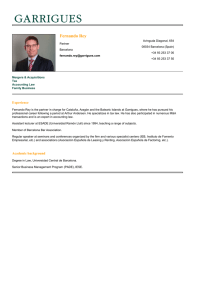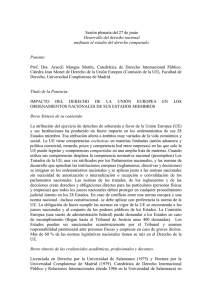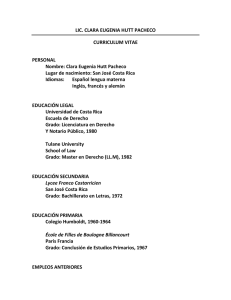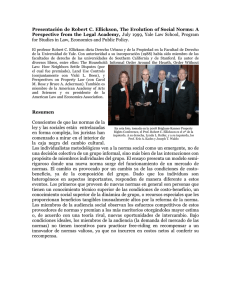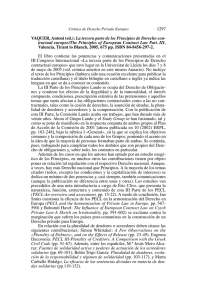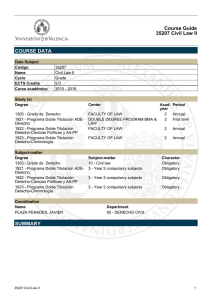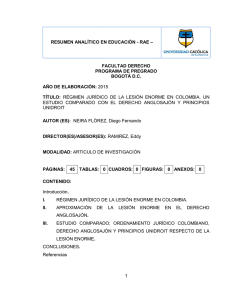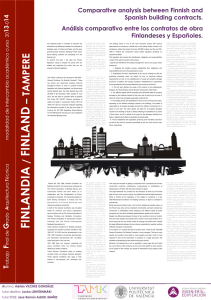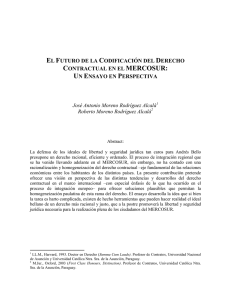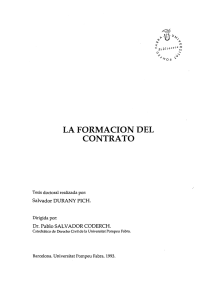14 La formacion NUEVO.p65
Anuncio
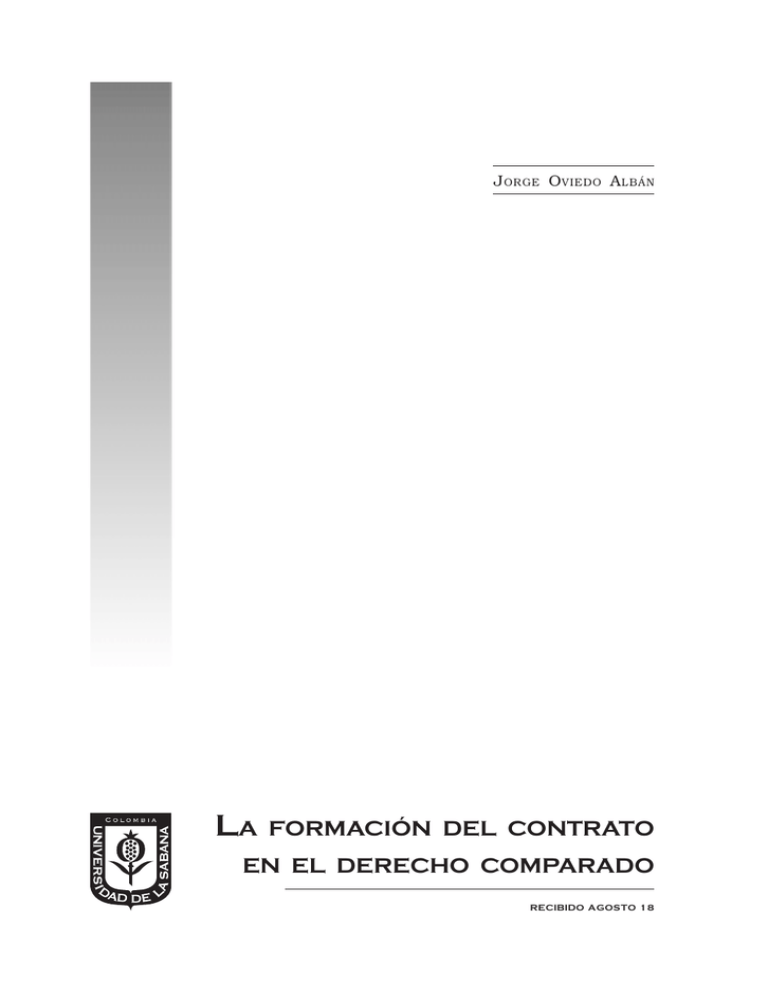
J ORGE O VIEDO A LBÁN LA FORMACIÓN DEL CONTRATO EN EL DERECHO COMPARADO RECIBIDO AGOSTO 18 DÍKAION - LO JUSTO - ISSN 0120-8942 RESUMEN La presente investigación tiene por objeto analizar la regulación de la formación del contrato en las principales legislaciones actualmente vigentes en el mundo. La mayoría de los países cuya legislación de derecho privado pertenece al sistema romano-germánico, tienen un régimen aplicable a la formación del contrato, contenido en los códigos civiles y/o de comercio. En el derecho anglosajón también se ha desarrollado un régimen jurídico sobre el tema contenido en costumbres, precedentes judiciales y como en el caso estadounidense, en el Uniform Commercial Code (UCC). Por otra parte, y dentro del intento de armonizar y unificar la legislación que sirva de marco a los procesos de globalización económica, la Comisión de Naciones Unidas para el Derecho Mercantil Internacional (Uncitral), el Instituto para la Unificación del Derecho Privado (Unidroit) y otras instituciones, como la Cámara de Comercio Internacional (CCI), trabajan en pro de la conformación de un sistema de derecho mercantil uniforme, tratando de salvar los escollos derivados de las diferencias entre los diversos sistemas jurídicos y las falencias del derecho internacional privado. Fruto de estas labores, y para el tema que nos ocupa, es la Convención de Naciones Unidas para los Contratos de Compraventa Internacional de Mercaderías, los principios de Unidroit para los contratos comerciales internacionales, y los principios del derecho europeo de contratos, elaborados por la Comisión Lando. Estos instrumentos pretenden conciliar las diferencias existentes entre los regímenes romano-germánicos y anglosajones (civil law y common law). 214 Adicionalmente, algunos países han adoptado la ley modelo de Uncitral sobre comercio electrónico, la cual hace un llamado expreso a la legislación existente en materia de obligaciones y contratos, introduciendo LA FORMACIÓN DEL CONTRATO EN EL DERECHO COMPARADO algunas reglas sobre el particular. Otros países han realizado modificaciones a su legislación interna regulando aspectos de la formación del contrato por medios electrónicos. El régimen uniforme tiene diferencias de fondo con las legislaciones internas y el tratamiento que en ellas se da al tema, lo que plantea problemas prácticos y teóricos. Por otro lado, debe tenerse en cuenta que las normas sobre formación del contrato contenidas en las leyes civiles o comerciales, hoy se complementan con estatutos de protección a consumidores y usuarios, y defensa de la competencia, las cuales regulan aspectos relativos a las condiciones de oferta, tales como el deber de información, la publicidad engañosa, etc. PALABRAS CLAVE Tratos preliminares, oferta, aceptación. ABSTRACT The objective of this research is to analyze the regulation of contract formation in the main legislations currently in force in the world. In most countries whose legislation of private law is derived from the Roman-Germanic system, the regime which is applicable to the formation of contract is contained in civil and/or commercial codes. In Anglo-Saxon law, a juridical regime on the subject has also been developed and is contained in customs, judicial precedents and, in the United Sates, in the Uniform Commercial Code (UCC). On the other hand, in an attempt to harmonize and standardize the legislation that is expected to act as a framework for the economic globalization processes, the United Nations Commission for International Trade Law (Uncitral), the International Institute for the Unification of Private Law (Unidroit) and other institutions such as the International Chamber of Commerce (ICC) are working towards the configuration of a uniform system of mercantile law, trying to overcome the obstacles stemming from the differences among the several juridical systems and from the deficiencies of international private law. In our case, these efforts resulted in the United Nations Convention on Contracts for the International Sale of Goods (CISG), the Unidroit principles for international Nº 14 14 -- 213-215 CHÍA, COLOMBIA OVIEMBRE AÑO 19 - Nº - CHÍA, -CNOLOMBIA - N2005 OVIEMBRE 2005 215 DÍKAION - LO JUSTO - ISSN 0120-8942 trade contracts, and the principles of the European law of contracts prepared by the Lando Commission. These instruments intend to reconcile the existing differences between the Roman-Germanic and Anglo-Saxon regimes (civil law and common law.) In addition, some countries have adopted Uncitrals model law regarding electronic commerce, which explicitly draws attention to the existing legislation on obligations and contracts culminating in the introduction of some rules. Other countries have modified their internal legislation by regulating aspects of contract formation through electronic means. The uniform regime poses serious differences with the internal legislations and their handling of this issue raising practical and theoretical problems. On the other hand, it is necessary to bear in mind that the norms on contract formation contained in civil or commercial laws are at present complemented with statutes for the protection of consumers and users and for the defence of competition. These statutes regulate aspects regarding offer conditions such as the duty to inform, misleading advertising, etc. KEY WORDS Preliminary deals, offer, acceptance. 216
